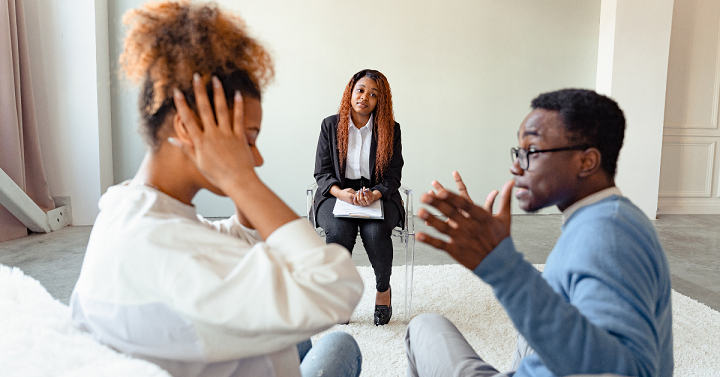Benefits of Relationship Counseling
Introduction
Relationships are the most vibrant and dynamic threads in the complex tapestry of human interactions. Relationships, whether they be sexual, family, or platonic, are fundamental to our social structure. But relationships are prone to fraying and unraveling under the weight of disagreements, miscommunications, and unresolved difficulties, just like any delicate tapestry. This is where relationship therapy steps in as a ray of hope, providing a host of advantages that can revitalize and fortify our bonds.
A Guide to Healing Relationship Counseling
An understanding Relationship counseling is a therapeutic procedure intended to assist individuals and couples in navigating the difficulties of their relationships. It is also frequently referred to as couples therapy or marriage counseling. It offers a secure and encouraging setting where individuals can examine their feelings, ideas, and actions under the supervision of a qualified expert.
interpersonal counseling’s primary goals are to improve communication, understanding, and constructive interpersonal dynamics. Couples can explore the root causes of their disputes and acquire useful techniques for growth and resolution by combining talk therapy, psychoeducation, and hands-on activities.
Relationship counseling’s transformative benefits
This enhanced communication abilities Healthy relationships are based on effective communication. Couples can improve their communication skills by learning constructive ways to express their wants, worries, and feelings through relationship counseling. Couples can close knowledge gaps and build stronger bonds by encouraging candid communication and attentive listening.
Resolution of Conflicts
Disagreements arise in all relationships; nevertheless, the way these disputes are handled determines the longevity of the partnership. Couples who attend relationship counseling get vital skills and strategies for settling disputes amicably and constructively. Couples can resolve conflicts amicably and understandingly by recognizing the root causes of the conflict, considering each other’s viewpoints, and learning to compromise.

Rediscovering Intimacy
Stress, resentment, unresolved disputes, and other circumstances can cause the spark of intimacy in relationships to fade over time. Relationship counseling offers a nurturing setting where couples can rekindle their emotional and physical closeness. Through cultivating trust, openness, and empathy, partners can strengthen their emotional connection and rekindle their enthusiasm for one another.
Meeting Individual Needs
Unmet needs or unsolved personal difficulties are frequently the root cause of relationship problems. In addition to acknowledging the influence these elements have on their relationship dynamics, relationship counseling enables couples to explore their own identities, beliefs, and aspirations. Couples can develop a fuller relationship and a deeper sense of self by attending to each other’s needs and encouraging self-awareness.
Preventive Maintenance
Relationship counseling is a type of preventive maintenance for our emotional well-being, much as we visit a doctor for routine checkups to maintain our physical health. Before disputes turn into more serious concerns, couples can proactively handle new issues, improve their interpersonal skills, and deepen their bond. Early relationship counseling investments help couples build a strong foundation for a successful partnership.
How to go About Making Positive Changes
Despite the many advantages of relationship counseling, it’s critical to understand that both couples must be willing to commit to, tolerate, and be vulnerable during the healing and growing process. For individuals thinking about relationship counseling, keep the following points in mind.
Adaptability to Change
It takes an openness to change and a willingness to examine uneasy feelings and behaviors to engage in effective treatment. Couples who attend relationship counseling should be prepared to face obstacles head-on and have an open mind.
Active Participation
As a collaborative practice, relationship counseling calls for both partners’ active involvement and participation. A shared commitment to attending sessions, finishing homework, and putting the skills learned in therapy into practice is essential for success.
Patience and Persistence
Therapy progress may not always be linear, and healing and transformation require time. Couples should be persistent and patient, having faith in the therapy process and acknowledging little accomplishments along the way.
Seeking the proper Fit
The success of relationship counseling depends on selecting the proper therapist, as not all therapists are made equal. It is recommended that couples look for therapists that specialize in couples therapy, exhibit cultural competence and empathy, and provide a secure and judgment-free environment for exploration.
Conclusion
Fostering Vibrant Connections via Counseling there has never been a more important need for solid, enduring relationships in a world of perpetual change and volatility. A revolutionary route to connection, growth, and healing is provided by relationship counseling, which gives partners the tools they need to handle the challenges of their relationships with grace and understanding.
Couples can realize the full potential of their relationships, forging deeper connections and laying the groundwork for a lifetime of love and cooperation, by embracing the advantages of relationship counseling and making a commitment to the path of self-discovery and mutual support. Let us keep in mind that the real beauty of relationships is found in our ability to grow, heal, and prosper together as we negotiate the complexity of interpersonal interactions.


